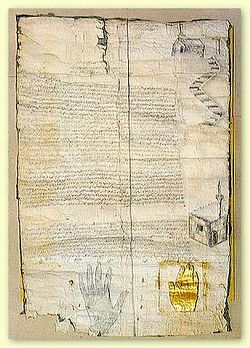(Redirigido desde «Achtiname de Mahoma»)

El Ashtiname o Achtiname (en árabe: دير سانت كاترين; en griego: Αχτιναμέ του προφήτη Μοχάμεντ; en persa: آشتینامه محمد) es un documento que data del siglo VII escrito en forma de compromiso de protección, conferido por el profeta musulmán Mahoma al monasterio ortodoxo de Santa Catalina en la Península del Sinaí.
Āshtīnāmeh (ɒʃtinɒme) es una palabra de origen persa que significa "libro de paz", un concepto persa para denominar a un tratado o convenio.[1]
Bibliografía
- Lafontaine-Dosogne, Jacqueline. "Le Monastère du Sinaï: creuset de culture chrétienne (Xe – XIIIe siècle)." In East and West in the Crusader states. Context – Contacts – Confrontations. Acta of the congress held at Hernen Castle in May 1993", ed. Krijnie Ciggaar, Adelbert Davids, Herman Teule. Vol 1. Louvain: Peeters, 1996. pp. 103–129.
- Jean-Michel Mouton – Andrei Popescu-Belis, "La fondation du monastère Sainte Catherine du Sinaï selon deux documents de sa bibliothèque: codex Arabe 692 et rouleau Arabe 955", Collectanea Christiana Orientalia 2 (2005), pp. 141-205
- Ahmed El-Wakil, "The Prophet's Treaty with the Christians of Najran : an Analytical Study to Determine the Authenticity of the Covenant", Journal of Islamic Studies 27:3, 2016, p. 273–354.
- John Andrew Morrow (Dir), Islam and the People of the Book, Volumes 1-3: Critical Studies on the Covenants of the Prophet, Cambridge Scholars Publishing, 2017, 1782 p., ISBN 978-1527503199
Referencias
- ↑ Dehghani, Mohammad (11 de agosto de 2014). «'Āshtīnāmeh' va 'Tovāreh', do loghat-e mahjur-e Fārsi dar kuh-e sinā». 'Ayandeh' magazine. 1368 Hš. p. 584. Archivado desde el original el 11 de agosto de 2014. Consultado el 29 de octubre de 2019.








